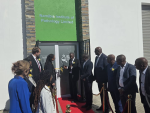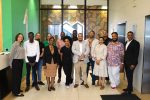For decades, the Namibia Institute of Pathology (NIP) operated strictly as a diagnostic service provider, its laboratories processing millions of tests annually for diseases ranging from HIV to COVID-19. But when global supply chains crumbled during the pandemic, leaving NIP scrambling for basic laboratory consumables like specimen collection tubes, the state-owned entity faced a reckoning. Now, NIP is stepping onto an unfamiliar stage: manufacturing. Its ambitious plan to establish Namibia’s first medical injection moulding facility in Swakopmund marks a strategic pivot from dependency to self-reliance—a move poised to reshape the country’s healthcare resilience and economic landscape.
The seeds of this transformation were sown during the chaos of COVID-19. As nations hoarded medical supplies, NIP—responsible for 80% of Namibia’s diagnostic services—found itself at the mercy of international suppliers. Orders for critical items like virus specimen tubes were delayed or diverted to larger markets. At one point, the institute resorted to using donated reagents and substandard tubes, exposing vulnerabilities in Namibia’s healthcare infrastructure. “The pandemic was a wake-up call,” reflected Dr. Iyaloo Konstantinus, NIP’s Head of Research and Development “We realized that waiting for global suppliers to prioritize a small market like ours was unsustainable.”
The NIP Manufacturing Hub, backed by a N$15 million investment and a EUR 155,000 grant by the German government and the European Union, and implemented through the Deutsche Gesellschaft für Internationale Zusammenarbeit (GIZ) GmbH, will produce essential laboratory consumables, including virus specimen tubes and urine/stool cups. This major step forward in advancing regional economic integration and industrial development has been further achieved together with the Southern African Development Community (SADC) Secretariat.
“We will produce 2.7 million tubes in 2025, scaling to 5.5 million by 2028,” Dr. Vaino Shivute, NIP Board Deputy Chairperson said.
The economic calculus is compelling. With annual demand for 225,000 tubes, savings could exceed N$3 million yearly, freeing up resources for other critical healthcare investments. Over four years, the project is projected to generate a net benefit of N$6.3 million, alongside revenue from regional exports. These figures, however, only scratch the surface of the venture’s potential.
Beyond cost savings, the initiative addresses systemic gaps in Namibia’s economy. The manufacturing sector remains underdeveloped, contributing just 10% to GDP. By establishing a medical supply production hub, NIP aims to catalyze ancillary industries—engineering, logistics, quality assurance—while creating jobs.
“The Manufacturing Hub is projected to create direct employment for 15 professionals in its first phase—scientists, process engineers, technicians, quality control officers, security officers, cost-accountants, cleaners, dispatchers and drivers—with plans to expand to over 20 jobs as production scales. These are not just numbers; they represent families uplifted, honed, and futures secured,” the Governor of the Erongo Region, Neville Andre said adding “But the impact extends far beyond the factory floor. Through partnerships with the Namibia University of Science and Technology (NUST) and the University of Namibia (UNAM), this facility will serve as a training ground for the next generation of engineers and innovators.”
For NUST, the collaboration is transformative. The university’s FabLab, an innovation hub, will integrate the injection moulding project into its curriculum, equipping students with rare technical skills. Geopolitically, the project aligns with regional ambitions. SADC nations imported over 40 million COVID-19 test kits during the pandemic, highlighting reliance on foreign manufacturers. By positioning itself as a regional supplier, Namibia could reduce this dependency while bolstering intra-African trade. Swakopmund’s strategic location—near the port of Walvis Bay—facilitates efficient import of raw materials like PET resin from China and eventual exports across SADC. The town’s existing infrastructure for green hydrogen and energy projects further enhances its appeal as an industrial hub.
Healthcare implications are equally profound. Local production ensures a steady supply of tubes, minimizing diagnostic delays during outbreaks. During COVID-19, stockouts forced NIP to ration testing, undermining pandemic response. With in-house manufacturing, the institute can scale production rapidly during crises. Moreover, controlling quality reduces risks of faulty tubes compromising test results—a recurring issue with rushed imports. The project also dovetails with Namibia’s push for precision medicine; reliable specimen collection is foundational for advanced diagnostics like genomic sequencing.
Yet challenges loom. NIP’s revenue—primarily from government contracts—is vulnerable to budgetary delays, necessitating partnerships with private investors and international donors. Technical hurdles include establishing ISO-certified cleanrooms and navigating complex procurement processes for machinery. Market penetration in SADC will require overcoming competition from established Chinese suppliers and navigating regulatory heterogeneities across borders.
Environmental considerations add another layer. While modern injection moulding machines are energy-efficient, the use of plastics like PET and LDPE raises sustainability concerns. NIP plans to mitigate this by exploring recycled materials and waste-reduction protocols, though specifics remain nascent.
Despite these hurdles, the project’s symbolic significance cannot be overstated. It represents a broader shift in Namibia’s economic strategy—from resource extraction to value-added production. By venturing into manufacturing, NIP is not just securing its supply chain; it’s challenging the narrative that African nations must remain perpetual importers. The institute’s partnership with NUST underscores the role of academia in driving industrialization, while its focus on SADC markets reflects pan-African solidarity in health sovereignty.
In the words of Shivute, “When we dare to dream, when we invest in ourselves, and when we unite as one people, no challenge is insurmountable.” As the first locally produced specimen tubes roll off the assembly line, they’ll carry more than medical samples—they’ll bear the weight of a nation’s industrial aspirations.










